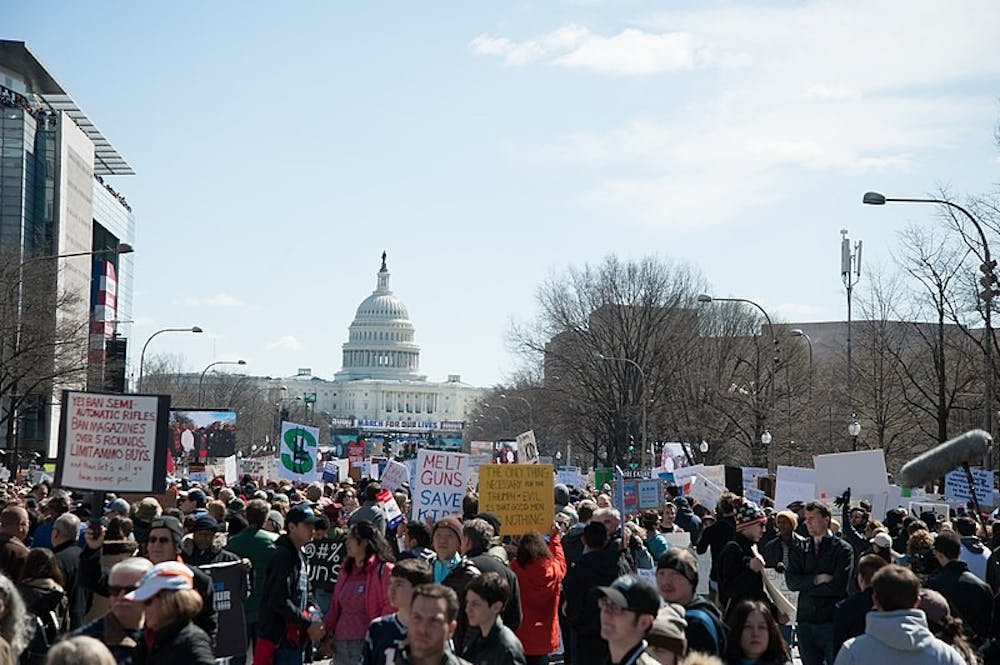We live in a renewed age of political demonstrations, as marginalized groups have begun to demand attention and call for social and legislative change with heightened urgency. The Women’s March, Black Lives Matter rallies and resistance to the Dakota Access Pipeline will be remembered alongside the likes of the 1963 March on Washington as defining points in American history.
The March For Our Lives at the Capitol Building on Saturday, organized by a group of students at Marjory Stoneman Douglas (MSD) High School in the weeks after a shooter killed 14 of their classmates and three teachers, has already joined these historic ranks. The organizers estimated that about 800,000 people packed Pennsylvania Avenue calling on politicians to enact stricter gun control measures.
After the shooting in Parkland, Fla. on February 14, the survivors garnered a lot of attention from the national news media and used their momentum to push for federal legislation like mandatory background checks on gun sales and a ban on AR-15 automatic weapons.
Many have criticized these teenage organizers, saying that the reason they have received such attention is because they are mostly white and from an affluent community. Reminders have circulated on social media that people of color protesting gun violence have been widely persecuted for decades. Leading up to the March and in the days following, there were calls for conversations about gun control to include a more diverse range of voices.
The organizers from MSD have gathered so much attention because they aren’t expected to be victims of gun violence. Their race and socioeconomic status sets them apart from typical media portrayals of the victims (impoverished people of color). But we have got to stop blaming that on the organizers themselves.
I was at the March, so I wasn’t watching live coverage at the time, but clips that I’ve seen on the news and on social media typically focus on the mostly white survivors from MSD who spoke at the March. What the media often leaves out is that out of the 20-or-so young people who spoke, more than half were people of color.
Do those speakers accurately represent decades of people of color who have spoken out against gun violence and been silenced? No. But was it clear to me that these kids made a real effort to include a diverse range of voices and center those who often don’t get the chance to speak.
They also made it clear that the March was not just a response to school shootings but a wider effort to demand gun control reforms. Several of the speakers, all teenagers or even younger, addressed the effects of gun violence that disproportionately affects youth of color in American cities.
It is right to say that conversations about gun violence should include people of color. It is right to say that these conversations should address systemic gun violence that plagues impoverished communities and communities of color. It is right to be angry that the MSD survivors only have the momentum that they do because of their privilege.
But it is not fair to blame them.
Blame the news media that unfairly depicts communities of color as responsible for their gun violence. Blame the white conservatives who scream “all lives matter” but disregard the lives of black and brown people in this country. Please blame the politicians who have systematically ignored people of color for generations, the same politicians that the MSD survivors are hoping to vote out.
These kids have used their momentum to get a foot in the door of Congress, and they are grabbing as many people as they can carry along for the ride. It remains to be seen whether they can keep that momentum going in the long term, but it’s clear that they don’t intend to leave anyone behind.
And are they perfect? Of course not. Alex Wind stood on that stage and said that bullets don’t discriminate. Sure, but history has shown that the men (yes, men) behind the bullets do.
It’s hard for me to look at the Pulse shooting, an attack in 2016 which targeted the Latino LGBTQ community and killed 49 people, and agree that bullets don’t discriminate. But hearing the organizers say they represented victims of Pulse alongside victims of other shootings in our history reminds me that my community will not be left out of this conversation.
Watching them feature such a diverse range of voices reminds me that inclusivity is not something Generation Z will have to learn because it is ingrained in their blood. Seeing them openly acknowledge their privilege, as Jaclyn Corin did during her speech at the March, reminds me that they are not defensive or trying to hog the victim narrative.
They are victims of gun violence that might have been prevented with common sense gun laws — there’s no doubt about that. But they know that they aren’t the only victims. It’s clear that they, too, are angry about the injustices of gun violence against people of color and other marginalized groups.
So, please, be angry. Be angry at the media. Be angry at our useless representatives in D.C. Be angry at white people for ignoring gun violence until it affects us. But please don’t blame the MSD survivors for their privilege. They are using it well.
Jacob Took is a sophomore Writing Seminars, English and Russian major from Denton, Texas. He is a News & Features Editor.





